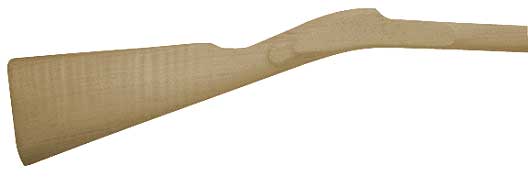|
|
P. O. Box 2791 Rockford, IL 61132 US Phone (815) 968-1995 Fax (815) 968-1996 |
|
|
|
| Home > Stocks and
Components > Early Fullstock Fowler
|
Stock and Pistol Prices Stock Blanks Single Shot/Antique Repeater Stocks Stocks and Components J. Armstrong Beck Boys Bedford County Blunderbuss J. Dickert Dueling Pistol English Rigby Sporting English Shot Gun A. Figthorn Early Fullstock Fowler Harpers Ferry Model 1803 Hawken Fullstock Hawken Halfstock Jaeger Kentucky Pistol Pre-Revolutionary Kentucky Early Lancaster Late Lancaster Lehigh County Leman Fullstock Leman Halfstock North Carolina Northwest or "Trade Gun" Ohio Schuetzen Halfstock Schweitzer Southern Mountain Tennessee Classic Tennessee Mountain Thompson Center Transitional Kentucky Trapper Pistol Tulle "Fusil de Chasse" Underhammer - H & A A. Verner Vincent Halfstock Virginia Locks Jim Chambers Locks L & R Locks R. E. Davis Locks Siler Locks Allen Box Lock & Inline Actions Triggers L & R Triggers R. E. Davis Triggers Other Triggers |
||||||||||||||||||||||
| Early Fullstock
Fowler |
|||||||||||||||||||||||
 |
|||||||||||||||||||||||
|
There is very little original written material on English guns of the 18th Century, but family records and archives indicate the fowling
piece was as popular then as it is today.
Some of the finest examples of these guns included relief carvings along the stock, engraving along the lock and an occasional inlay of silver. Some of these also had wire inlays. There were examples of both single and double barreled early fowling pieces, but the single is probably best known and was the model for the Northwest Trade Gun. There is little resemblance between the trade guns and their more illustrious ancestors. It should be remembered that hunting in England was a pastime reserved for those who could afford land and many of these were nobility. Their fowling pieces, like their other prized possessions, reflected their wealth and status. Barrels for these guns came from Italy and Spain and examples of these carefully carved shotguns can still be found bearing the name of prominent Italian craftsmen of the period. This is not because there were not satisfactory barrels being produced in England at the time, rather it was probably a novelty that "gentlemen" of the period enjoyed - the purchase of a fine barrel during their travels through continental Europe. The stock for these fowlers should be made of high-quality wood and the maker should pay careful attention to the fitting of the metal parts (generally fittings were made of steel) to the wood. The front sight was often of silver or gold. A fowling piece of this type marked the owner as a gentleman and sportsman of this time. We believe our stocks should reflect this fine tradition. |
|||||||||||||||||||||||
 |
|||||||||||||||||||||||
|
|
||||||||||||||||||||||
